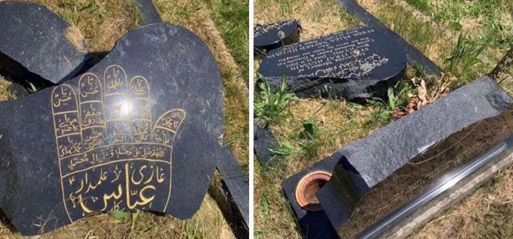
Elham Asaad Buaras
Eighty per cent of anti-Muslim hate crime victims, following the UK’s summer riots, did not report their ordeals, a new survey by the Women’s Muslim Network UK (MWNUK) has revealed. Conducted after violent unrest across multiple towns, the survey highlights a concerning surge in Islamophobia, with many Muslims feeling either disillusioned or too afraid to speak out.
The unrest, sparked by false reports about the identity of a stabber in Southport on July 19, led to widespread violence against migrants, Muslim communities, mosques and Muslim-owned businesses, resulting in numerous arrests and prison sentences. Shaista Gohir, CEO of MWNUK, presented the report, titled *Anti-Muslim Hate: Concerns and Experiences*, to Prime Minister Keir Starmer, urging the government to take swift action in response to its alarming findings.
Data from the Home Office shows that hate crime against Muslims has steadily increased since the government started tracking comparable figures in 2013, with the only drop occurring during the height of the COVID-19 pandemic in 2020/21. Muslims remain the most targeted religious group, accounting for 42 to 50 per cent of all religious hate crime offences in the UK, according to police records for England and Wales.
The survey participants expressed growing fears for their safety. Before the riots, only 17 per cent were “very worried” about their safety, but this figure surged to 73 per cent following the violence, with an additional 14 per cent stating they were “fairly worried,” bringing the total to 87 per cent of those concerned for their wellbeing and that of their families.
The report revealed that most of these hate crimes—75 per cent—occurred outdoors in public spaces, such as streets, parks, and bus stops.
One of the most troubling revelations from the MWNUK’s report is that the vast majority of hate crimes experienced by Muslims in the last five years have gone unreported. This silence, according to Gohir, prevents authorities from grasping the full scale of the issue.
“Muslims are aware of what constitutes a hate crime, but these incidents are often not reported because victims believe they won’t be taken seriously, or they fear retribution,” Gohir said. “It is important to capture these experiences, even if they don’t meet the criminal threshold, to better understand the scale of anti-Muslim hate and develop appropriate policies and legislation.”
The report found that of the 191 Muslims surveyed in August 2024, 67 per cent had experienced some form of online or offline hate in the past five years. Disturbingly, 18 per cent of respondents said they encountered hostility within one week of the riots.
Baroness Gohir expressed concern about the persistent nature of these incidents, highlighting that one in four had experienced hate crimes between five to ten times, and one in ten had been targeted more than ten times.
The report also sheds light on the disproportionate impact anti-Muslim hate has on women. “The heightened fear and anxiety is leading to changes in the daily behaviour of many Muslims, particularly women,” Gohir explained. “Some are avoiding certain areas, changing their routines, or even withdrawing from public life. This fear may deter Muslim women from pursuing education or employment opportunities, perpetuating economic disadvantages and limiting social mobility.”
Online abuse has also become a major concern for Muslims, particularly since the riots. Before the unrest, only 12 per cent of respondents were “very worried” about their online safety, but this has since jumped to 36 per cent, with a further 28 per cent being “fairly worried.”
“Many Muslims mentioned that they either didn’t use social media often, had reduced their usage, or were very cautious, opting to use privacy settings and primarily interacting with people they knew,” Gohir said. “Several expressed concerns about the toxicity of social media, noting that they had encountered racist and Islamophobic comments. They were particularly worried that such comments remained on platforms even after being reported, fearing that this could lead to increased offline hatred.”
Baroness Gohir raised the issue in the House of Lords, where she asked Lord Wajid Khan, the Minister for Faith and Communities, what the government was doing to tackle the rising tide of anti-Muslim hate in Britain.
“The voices and experiences of Muslims must be central to the government’s efforts to combat hate crime,” Gohir said. “We hope that the government takes these recommendations seriously and implements new hate crime plans, policies, and legislation that effectively protect Muslim communities.”
As anti-Muslim hate continues to rise, there is growing pressure on the government to ensure that the safety, dignity, and rights of Muslims are protected, both in public spaces and online. By ignoring the experiences of these communities, there is a risk that hate crimes will not only persist but become further embedded in British society, exacerbating social divides and eroding trust in public institutions.
(Archive photo Muslim grave vandalised in Blackburn)